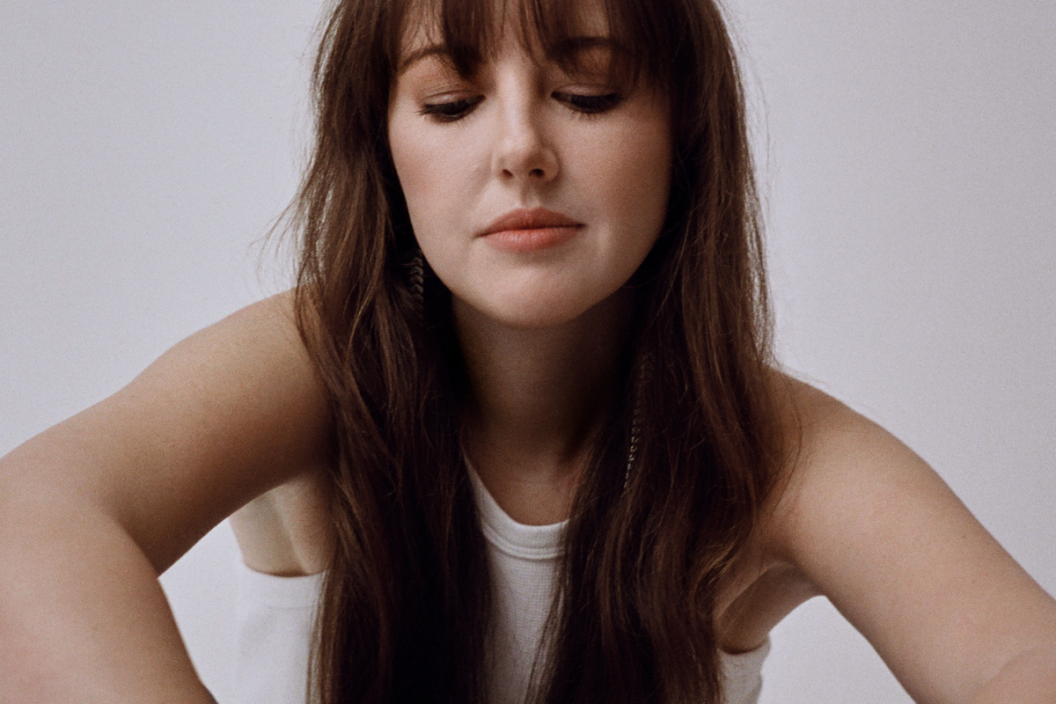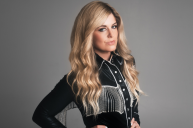She never thought she'd sing again. Jordyn Shellhart, then only 15, began to notice it became increasingly difficult to perform live. The young teen, who once performed on the Grand Ole Opry stage, found that she couldn't hit the notes like she used to. Her voice slipped through her fingertips, and she was then forced to find her identity without music. Diagnosed with spasmodic dysphonia, an incurable condition, she traded in her ambitions for stardom to writing songs for others.
Over the next several years, Shellhart landed cuts with Little Big Town (the Grammy-winning "Sugar Coat"), Kelsea Ballerini ("Secondhand Smoke"), Mickey Guyton ("How You Love Someone"), Don Williams ("I Won't Give Up on You") and others. She might have lost her literal voice, but she quickly discovered her figurative one.
While she nurtured her songwriting, a funny thing happened: her voice came back. "I had one moment when I was at an Emmylou Harris concert, and I was singing along to 'Easy from Now On' under my breath in the crowd," she recalls. "I didn't even do that anymore. I realized that I could do this to be kind of normal. So I went home and started playing the song on guitar and singing. That was the first time where I could sing a song all the way through."
Her singing ability remained inconsistent, yet she had hope. In the coming years, it "started becoming less of a worry and less of an obsession in my head," she says. "I was able to heal some of the mental anguish that I had built up around singing. I just wanted to trust myself again."
Her healing became a gradual process, each delicately-caressed note a stepping stone to her reclaiming her voice, and along with it, her self-worth. Admittedly, she couldn't tell whether her voice's return was "a miracle or a misdiagnosis," but it ultimately doesn't matter. Her voice roared back stronger and better than ever.
But it took her time to get ready and reintroduce herself to the world. Once the pandemic hit, her perspective on life and music cataclysmically shifted. It seemed as good a time as any to step back into the studio. Calling up producer Cameron Jaymes (Spencer Sutherland, Daya, Rachel Platten), she set about crafting what would soon become her long-awaited debut, Primrose, for Warner Nashville. 12 songs sprout from her soul, transformative and probing. The collection, boasting such songwriting partners as Allen Shamblin and Barry Dean, contains the kind of songwriting that forges legacy careers.
Building one instrument at a time and overdubbing when necessary, the endeavor pushed Shellhart to regain both her confidence and creativity. "It started out just him and me demoing and trying to get the vibe with the first handful of songs," she says, noting the recording process took place in Jaymes' shed. "It felt comfortable because it was still such an insular sort of friendship-fueled experience. I was able to build on a piece of confidence and able to start stepping into that role of making an album."
With album opener "Amelia," Shellhart glides over the melody, turning in unexpected key changes to keep the listener on their toes. "Amy I hope that you're not still angry about the thing I said to you last night," she sings, sliding between chords in a very Beatles-esque move. "It was only a joke but I know how you get / I forgive you for starting to cry."
Written in a coffee shop, the singer-songwriter spent just five minutes penning the song. From its rhythmic thunder to a melody as sweet as honeydew, "Amelia" deceives the senses when the lyrics cut deep below the surface. "It's about the insidious nature of abuse of just taking someone's identity," she says. "It's illustrating that you're just changing someone's name and saying, 'I know you want to be called Amelia, but I'm going to call you, Amy, because I decided that that's who you are.' That lyric crashed into my head through that little nugget of thought."
Rooted in similar percussive elements, "Irrelevant" oscillates between intimacy in the verses to ballooning on the chorus, allowing Shellhart to engage both parts of her voice. "Look under the rug and then open up the closet, I'm sure there's some skeletons," she sings. "We can talk about it or we don't really have to / But this room's got no elephant 'cause now the past ain't just the past / It's irrelevant."
"I'd been trying to write that guitar part for years. I think I have written four versions of songs with that guitar. And it never quite was working for me," she admits, noting that co-writer Melissa Pierce contributed over Zoom. "I had those verses written for a different song, and I was just trying to figure out how to put it all together. I didn't know what the chorus was. So, the three of us went through all the information and somehow stumbled upon that idea. None of us came in with the title or the idea or anything, but somehow we stumbled upon 'the past isn't just the past, it's irrelevant.'"
Called one of her "therapy songs," Shellhart peels back the layers of her heart with "Maybe Someday You'll Have a Daughter." She went to breakfast with good friend Courtney Dashe when she poured out her pain, and the two ventured back to Dashe's house where the duo scrawled out the song's tender, visceral lyrics. "I hate that I gave away what wasn't even yours to take," she sings, "'cause for all that it meant to me, now it only means a mistake."
Shellhart had been trying for weeks to write the song, and it just wasn't coming. She was feeling "completely underwater as a young female." But that morning, everything changed. The song fell into her lap, and she knew immediately it was hers to keep. "The bones of it were pretty natural, and that's the case for all of the songs on the album. Sometimes that's how I feel... I know the ones that are supposed to be for me, and the ones that feel like they just sort of happened to me rather than me happening to them."
Perhaps the most powerful song on the album, "Near-Death Experience" bookends the record. In a song about abortion, Shellhart doesn't politicize; she simply tells a very real, raw human story through her perspective. Any fear of releasing the song seemed to wash away once she committed herself to being honest. "What I was trying to do with this song was just tell my own story. That freed me of fear," she says. "Now, there were fearful conversations around it, certainly from everybody on my team and trying to figure out what could happen were we to put it out."
"I know what my intentions were, and it's the same as my intention for every single other song on this album, which is to tell my story and be honest," she continues. "So I didn't really overthink it. It just felt like something that I wanted to put out; it is my story and my mom's story. And that's something that nobody can really challenge. It was totally devoid of any kind of ulterior motives, or even awareness of what I even would have thought about the issue at the time. My mom told me this, and I'm going to do what I do, which is processing through music."
In the song, she shares the story about how her mother once considered having an abortion but decided against it. "She drove all the way to the clinic downtown," she sings. "Then she either got brave or chickened out." Then, the chorus crashes in, as she confesses how thankful she is things turned out the way they did. "But here I am against whatever odds, speculating why she changed her mind," she sings. "Maybe it was her, maybe it was God / All I know is I'm glad to be alive."
Primrose, one of the year's best releases, demonstrates not only her ability to write a hook but her bravery. From "Dreams Chase You" to "On a Piano Bench Getting Wasted," the material benefits from her willingness to be vulnerable and unwavering in her honesty. Perhaps, we wouldn't have gotten such a taut, confessional record had she not allowed herself to be courageous.
"I gave myself the permission to be brave, and I have learned that bravery is something that meets you when you choose to be. It's not something you have before you make the decision," she says. "It's like something that shows up. Bravery can come alongside you. So that's been my experience with it. I've also learned that I just love music, and it doesn't have to be this thing that defines me or that I live and die by. It can just be fun with my friends, and that's what we did."
READ MORE: 'The Voice' Alum Kinsey Rose Resurrects Heartache for New Song 'Speed of a Broken Heart' [Interview]




